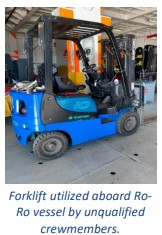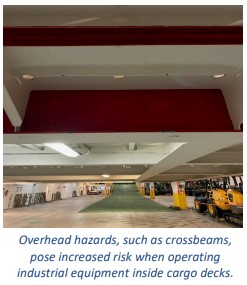USCG Marine Safety Alert, September 5, 2024
 This Safety Alert is an urgent reminder to vessel owners, operators, and crewmembers that no matter how straightforward operating powered industrial equipment (like forklifts) may appear, using this equipment without proper training or experience can lead to severe injury or death onboard vessels.
This Safety Alert is an urgent reminder to vessel owners, operators, and crewmembers that no matter how straightforward operating powered industrial equipment (like forklifts) may appear, using this equipment without proper training or experience can lead to severe injury or death onboard vessels.
Recently, two crewmembers on a roll-on/roll-off (Ro-Ro) vessel suffered severe head injuries when an inexperienced forklift operator struck an overhead crossbeam while moving between decks during cargo securing operations.
Investigations of this and similar incidents identified inadequate training as a contributing factor. Allowing inexperienced crewmembers to operate powered industrial equipment poses a significant threat to shipboard safety.
According to the Occupational Safety and Health Administration (OSHA), approximately 100,000 forklift-related injuries occur annually. Studies indicate enhanced training, retraining, and proper forklift operation procedures can reduce accidents by up to 70%.
 OSHA regulations detailed in Title 29, Code of Federal Regulations (CFR), Parts 1915, 1917, and 1918, outline industry standards for powered industrial equipment in shipyards, marine terminals, and longshoring. However, there are no specific requirements for shipboard operations by crewmembers.
OSHA regulations detailed in Title 29, Code of Federal Regulations (CFR), Parts 1915, 1917, and 1918, outline industry standards for powered industrial equipment in shipyards, marine terminals, and longshoring. However, there are no specific requirements for shipboard operations by crewmembers.
As a result, the Coast Guard strongly recommends that vessel owners, operators, charters, and other stakeholders:
- Review Shipboard Instructions and Standards. Ensure that procedures and training for the safe operation of powered industrial equipment (such as forklifts) are included in the Safety Management System, Cargo Securing Manual, and other relevant documents.
- Examine Risk Management Plans. Ensure hazard identification and awareness measures are in place to enhance crew safety when operating powered industrial equipment.
Investigations and inspection personnel should remain vigilant about this issue and initiate corrective actions as necessary.
Additional information on this subject and the associated hazards is available at the following links:
- OSHA Silica Exposure Publication 3396-06N, Ro-Ro Ship and Dock Safety
- Powered Industrial Trucks Standards
- Powered Industrial Truck Operator Training for Maritime
- ANSI B56.1-2020: Safety Standard for Low Lift, High Lift Trucks, available for purchase from the American National Standards Institute (ANSI). Provides standards for operator training and certification, design and stability, load handling, lifting capabilities, safety features, and maintenance.
This Safety Alert is provided for informational purposes only and does not relieve any domestic or international safety, operational, or material requirement. Developed by Sector Maryland-National Capitol Region and distributed by the Office of Investigations and Analysis. Questions may be sent to HQS-SMB-CG-INV@uscg.mil.